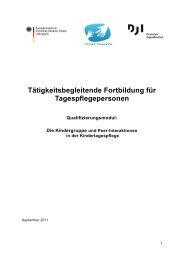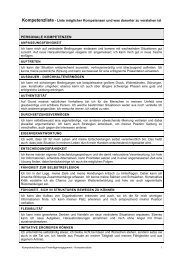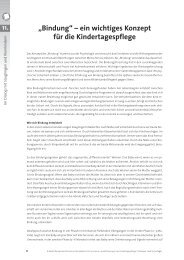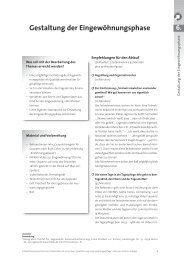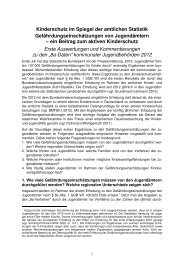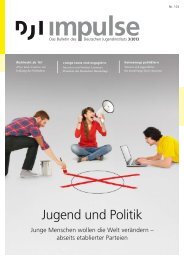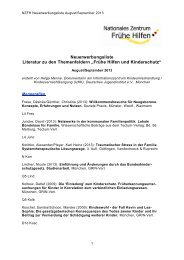download - Deutsches Jugendinstitut e.V.
download - Deutsches Jugendinstitut e.V.
download - Deutsches Jugendinstitut e.V.
Create successful ePaper yourself
Turn your PDF publications into a flip-book with our unique Google optimized e-Paper software.
that was struck in 2005 on matters such as training, research and youth co-operation in the<br />
Euro-Mediterranean area. The critical questions invariably hinge around three issues:<br />
• Labour market participation and employability<br />
• Participation, civil society and democratic renewal<br />
• Social integration and inclusion<br />
There are, of course, wider European challenges where the youth agenda clearly has a<br />
significant place. These include global economic competitiveness, human rights, the<br />
intergenerational contract, mobility and migration, and intercultural tolerance and<br />
understanding.<br />
From policy to practice<br />
Though I spend much of my time these days working at the policy level, my personal<br />
background is firmly in the realm of practice. I worked with young people for well over 25<br />
years. Moreover, my research work has often been ‘action-oriented’ and has involved<br />
studies of youth offending, youth unemployment, substance misuse, youth enterprise,<br />
school exclusion, social marginalisation, as well as evaluations of policy initiatives. I am<br />
fundamentally committed to improving the quality of our ‘offer’ to more disadvantaged<br />
and more disconnected young people, those I have always chosen to call the ‘disengaged’<br />
(not the disaffected).<br />
This is the year of the Council of Europe’s All Different All Equal campaign concerned<br />
with diversity, human rights and participation. We know that these are long term<br />
aspirations. We have to be sure that our policy directed at less equal young people really<br />
reaches them. If it is snapped up by the more included, then we will have failed and, in fact,<br />
contributed to the worsening of the ‘youth divide’. Thus we have to find mechanisms for<br />
ensuring that policy ‘engages’ the disengaged and this is unlikely to be achieved through<br />
short timescales, grand a priori claims for massive success, and an open offer. This raises<br />
many questions about the basis of funding policy initiatives, their timetables, and perhaps<br />
the need for more robust targeting of measures. Ultimately, however, it is about extending<br />
opportunity and experience to those young people who are currently denied it.<br />
The received wisdom, over time and across countries, is that the key factors for social<br />
integration and inclusion rest within four contexts: the individual, the family, the school<br />
and the community. This should be rather self-evident. But where there is an overall<br />
poverty of support and guidance for learning and development, there is inevitably a poverty<br />
of outcome, both for the individual and for those around them.<br />
So what should ‘youth policy’ be doing on this front? My view is as follows:<br />
1. We must bury the myth that education and employment should have some kind of<br />
‘natural’ connection. They are increasingly separate, in the sense that application<br />
and achievement in formal education holds the promise of labour market<br />
opportunity commensurate with qualifications. We have to rethink the balance of<br />
academic, vocationa and civic learning. We have to look at the relationships<br />
between formal and non-formal learning methods and contexts. We have to ask<br />
how important it is that qualifications should have credibility and currency (where<br />
and who for). And we need to make sure that there are second (and third) chances<br />
102



